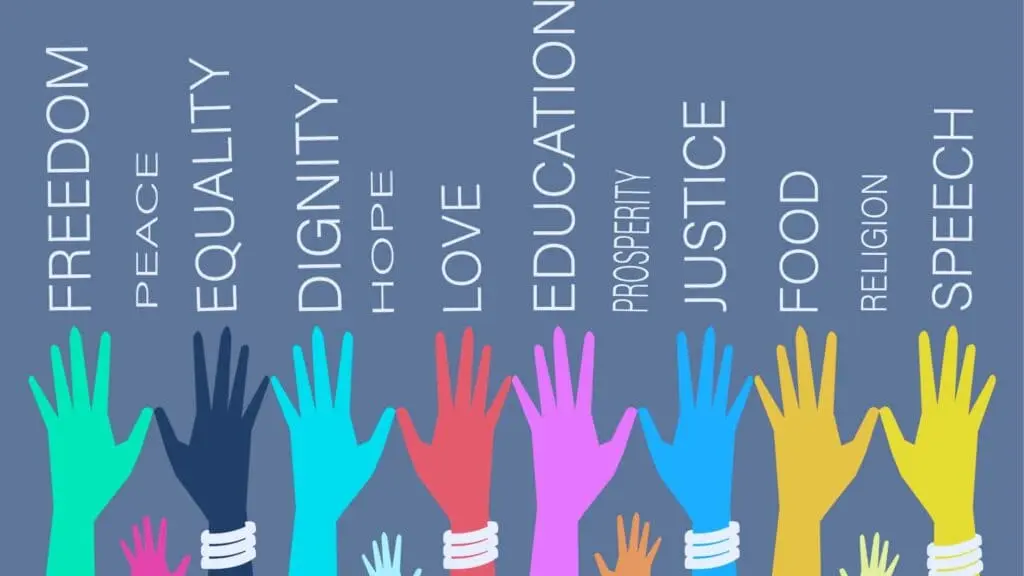Development of Human Rights : The evolution of human rights in India can be traced back to the 15th century BC scriptures. Moreover noteworthy that India has embedded the concept of human rights since ancient times and the same rights were later discovered by the West. Human rights are traditionally called “Man’s natural rights”, which include people’s lives, liberties and happiness. Human rights in India originated long ago.

It can be easily distinguished from the principles of Buddhism and Jainism. Hindu religious books and religious texts such as the Gita, the Vedas, the Arthasatra and the Dharmastra also contained rules on human rights. Human rights are the most important fundamental rights for human beings to live in peace in all parts of the world.
Human rights have been integrated into our society since the dawn of human civilization. In the beginning, it may be violated, but it cannot stop being there. Human rights are based on dignity, equality and respect for human beings irrespective of religion, race, caste, gender and place of birth.
They are universal, inseparable and essential parts of every human life. From the very beginning of human civilization, people fought for fundamental freedoms and freedoms, which paved the way for the existence of the concept of “Human Rights”. The reasons for the development of the concept of human rights are social, political, economic conditions, norms of society, nature and the needs of the people.
Read also: India income tax 2022 complete guide
What Is Human Rights?
- Human rights are fundamental standards, without which man cannot live with dignity. The main idea of human rights is that every person should respect the rights of the other and help each other if their rights are violated or violated in any way.
- The word “Human” means Human or The Nature of Humanity and the word “Rights” refers to what each person possesses or permits in society.
- Human rights are like freedom, equality and democracy and it is difficult to define. Human rights vary according to place, people, time and other circumstances.
- It will keep changing according to the social and economic conditions of the community. Human rights are a universally accepted principle that enables every human being to live in peace, freedom and justice.
Historical Human Rights in India
- The evolution of human rights in India can be traced back to the fifteenth century BC scriptures.
- It is noteworthy that India has embedded the concept of human rights since ancient times and the same rights were later discovered by the West.
- A wide range of stories and judicial judgments echoed the notion of human rights and that human rights were considered “equality” in Vedic times.
Human Rights in Ancient Times
- There are many scriptures that explain human rights. The famous scriptural quote, “Let all be happy and free from all misery,” the king hopes not only to save the lives of the people, but also to improve human well-being and prosperity.
- Caudillier pleaded with the king to protect the rights of the people and the dignity of the people.
- Economics includes not only the civil and political rights created by the petition, but also the many economic rights of the people.
- Buddhism and Jainism defended the morals and dignity of the people. After the Buddha, Ashoka’s policy of non-violence led him to defend human rights, including equality, brotherhood, happiness and the freedom of the individual.
- Enjoyed many rights in the Hindu Empire. Ashok freed himself from hunger, disease and scarcity and forbade the torture and inhumane treatment of prisoners.
- Ancient times developed common ideas for promoting unity and harmony regardless of race, color, language, religion, or gender.
- Most Vedas and Smritis are said to be one family all over the world. The ancient judiciary greatly promoted freedom, equality and liberty for all people.
Read also: History of Tamilnadu complete guide
Human Rights in Medieval India
- Medieval India was popularly known as the Muslim period or the Muslim era.
- In pre-Mughal times, Hindus were forced to follow their own culture and religious practices.
- But, in the later Muslim period it was significantly changed and changed to its form.
- During the reign of Akbar, the Great, he brought about many changes in the way Hindus practiced their own religion.
- It is clear that the “human rights policy of international reconciliation and tolerance” was followed by the ruler and his son Jahangir.
- Since the accused had the right to be released on bail during the Mughal period, the accused could be released on suspicion.
- The Bhakti movement emerged in India and it re-created truth, justice, fairness and morality.
Human Rights in British Times
- Modern developments in human rights in India appeared during the British period.
- The torture perpetrated by the British against the Indians incited the Indians to fight against the British rule and encouraged the freedom fighters for the freedom struggle to defend their freedom and fundamental rights and freedoms.
- Gandhiji’s national movement emphasized not only the liberation of India from foreign rule but also the abolition of conspiracy, untouchability and Harijan rights.
- This movement is for the fundamental freedoms and civil and political rights of the people.
- The objective of the Indian National Congress was, at its inception, to protect human rights without discrimination on the basis of freedom, race, color, etc.